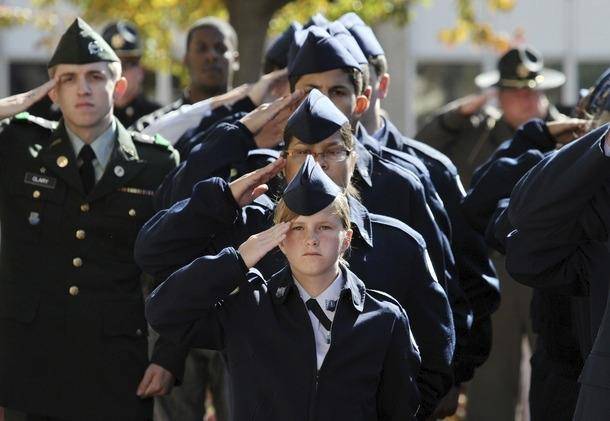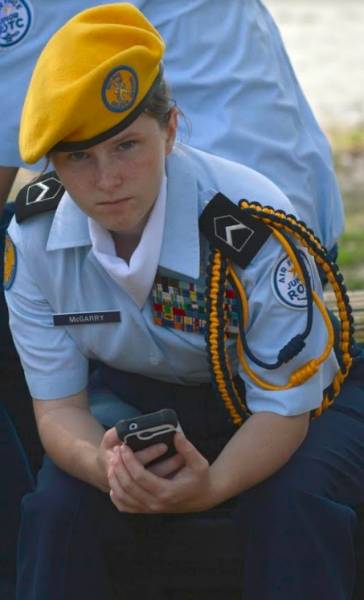My name is Payton McGarry. If you recognize it, that’s because I’m a client in Lambda Legal and the ACLU’s lawsuit against North Carolina’s anti-trans “bathroom bill” HB 2, and now its fake repeal HB 142.
What you may not know about me, though, is that I’ve wanted to be in the military ever since I was young. Like super young.
Like a lot of kids who grow up dreaming of entering the armed forces, I come from a military family.
Neither of my parents served, but pretty much every single one of my mom’s relatives did.
I remember checking books out from the library when I was nine or ten and staying up late to read the stories. They were always stories about joining the Army or being a Marine. I spent my whole life idealizing service members; wanting to become one of them.
In high school, I joined the Junior Reserve Officers' Training Corps (JROTC), and ended up being a unit commander for two years, which is pretty rare. I learned drill and ceremony. I learned the customs of my unit and branch (mine was the Air Force). I learned physical fitness training standards.
My unit and I put on our uniforms every Thursday, and it always felt right. I think I had around eight rows of ribbons, which is something like 24 awards for my time with my unit.
I was good at it. Really good at it. And not only that, but I also enjoyed it.
In my senior year of high school, I started to work out and spend time around the Marine Corps Recruiting Office.
I thought about doing the Delayed Entry Program (DEP), which allows for you to swear in for a while before shipping out to basic training. It works well for high school students who want to enlist before they graduate.
So, I filled out all the paperwork.
I still remember that day. My parents were both there with me, because I was 17 and needed a guardian’s signature. I had a 99 on my ASVAB (an aptitude test for enlistment), which is the highest score you can get. I had solid physical training scores. My only limitation was that I needed a waiver for my height (I’ve always been considered short, even when I was read as female). But I went through the process, took the tests (which included lugging around a 70 lb pack on my back) and had no problems.
They gave us a bunch of bumper stickers. I immediately went home and put them all on my car. My dad gave me a lot of crap for it, calling it tacky. But then he went and stuck a tiny one on the bottom corner of his old beat up white Buick. I’ll always remember that.
Then, a few months later, I was diagnosed with what – at the time – was called Gender Identity Disorder (GID), and is now known more accurately as Gender Dysphoria. The military considered GID a psychosexual disorder.
I was disqualified.
“Don’t ask, don’t tell” had been repealed years before, but I discovered that for trans people, it still very much existed.
So I stopped talking to my recruiter.
I just couldn’t tell him. He was from the Midwest and was very conservative. I was afraid of what he’d say, what he’d do or what he’d put in my file. This dream I’d had for so long came crashing down around me.
I was broken. All I could think was, “Thank God I applied to college.”
But I was also mad. Beyond the diagnosis, nothing else had changed about me. I was still the same person I’d always been, still as qualified and competent as always. I just finally had an answer for why I’d been confused about my assigned gender my whole life.
Fast forward to June of last year.
I was a rising junior at UNC Greensboro, still fresh into the HB 2 lawsuit, when Secretary of Defense Ash Carter announced that trans people would be able to serve openly in the military.
“This is it,” I thought to myself. I felt so excited that day. I thought I’d finally be able to do the thing I’d always wanted to do.
Secretary Carter stated that the change would take place on July 1, 2017, and that in that time the military would develop guidance and standards for making it a reality. He also announced that trans enlistees – provided that they met all other qualifications for enlistment – would have to be considered “stable” in their gender for 18 months (as certified by their doctor and verified by a military doctor) before being allowed to join.
A tall order, but not impossible.
So, I kept going to school, kept preparing and waited.






